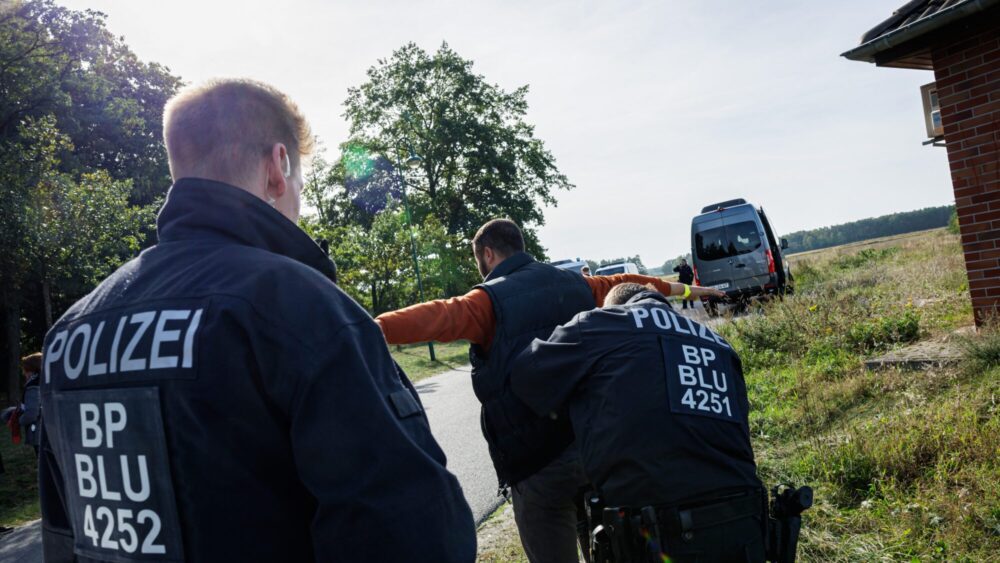
German police check migrants near the Polish border, 2023
Jens Schlueter / AFP
The German government has decided to implement temporary border checks on all of its land borders for the next six months in an attempt to curb illegal crossings into the country, the Interior Ministry announced on Monday, September 9th.
“We want to further reduce irregular migration. To this end, we are now taking further steps that go beyond the comprehensive measures currently in place,” Interior Minister Nancy Faeser said. She added that border checks are necessary until the EU’s external borders are sufficiently reinforced through joint action, although Brussels still lacks the legal framework for that.
According to Faeser, the measure is justified by the need to protect the country’s internal security from the “acute dangers posed by Islamist terror” and cross-border crime, as well as to alleviate the crushing “burden” on municipalities of having to accommodate and integrate too many asylum seekers.
Germany has already previously implemented similar measures along its borders with several neighboring countries, but the new move would extend border checks to all nine of its neighbors: Poland, Austria, France, Denmark, the Czech Republic, Switzerland, Belgium, Luxembourg, and the Netherlands.
The checks currently in place, which will soon expire, will also need to be extended for their periods to match the new ones, Faeser said. The leading members of the ruling ‘traffic light coalition’—Chancellor Scholz’s socialist SPD, the Greens, and the liberal FDP—are to meet later on Tuesday at the Ministry to discuss further details, but the plan is that the new checks will come into effect starting next week.
Despite the apparent necessity for the measures, the announcement immediately caused a backlash in Brussels and around Europe. Politicians slammed the decision for contributing to the ongoing, gradual breakdown of the EU’s borderless free movement area, the Schengen Zone, and said that the move would hurt border communities that depend on daily cross-border commutes.
“One of our most important freedoms is being jeopardized to send a political signal,” a liberal Dutch MEP from Renew said, advocating for external border protection instead—even though her party was also responsible for the lack of sufficient external protection measures in the EU’s new Migration Pact.
German opposition parties also regard the decision as a political move rather than a genuine effort, especially after the governing parties’ humiliating defeat in the recent regional elections in Saxony and Thuringia earlier this month and before the upcoming vote in Brandenburg in less than two weeks.
The staunchly anti-migration Alternative für Deutschland (AfD)—which won first place in Thuringia and ran the centrist CDU a close second in Saxony—reacted skeptically to the government taking a page out of its playbook after calling similar initiatives too extreme for months. “Oh, suddenly border controls? Wasn’t that ‘just Nazi?’” AfD co-president Alice Weidel replied to the news.
Ach, plötzlich #Grenzkontrollen? War das nicht "eben noch #NAZI ?" – #Weidel mit Ansage an Medien! #RemigrationJETZT #Messerattacken #Migrationskrise #faeserrücktritt pic.twitter.com/T7EAfTyFWG
— COMPACT-Magazin (@COMPACTMagazin) September 9, 2024
The CDU—the biggest opposition party, which has been riding anti-migration sentiment and calling for tougher border controls to stay ahead of AfD—voiced mild skepticism of the effectiveness of the plan, questioning whether it will actually involve turning back migrants after they have been caught crossing the border illegally.
“If the Federal Government wants us to go down this path together, then it will only work if we really do carry out comprehensive refoulement at Germany’s external borders,” CDU leader Frierdich Merz said.
However, Austria was quick to react saying that it would not accept any migrants if Germany tried to turn them back from its borders, foreshadowing an escalating diplomatic conflict between the two countries.
